Unit 2 Language grammar & word power
文档属性
| 名称 | Unit 2 Language grammar & word power |

|
|
| 格式 | rar | ||
| 文件大小 | 1.4MB | ||
| 资源类型 | 教案 | ||
| 版本资源 | 牛津译林版 | ||
| 科目 | 英语 | ||
| 更新时间 | 2011-04-24 00:00:00 | ||
图片预览

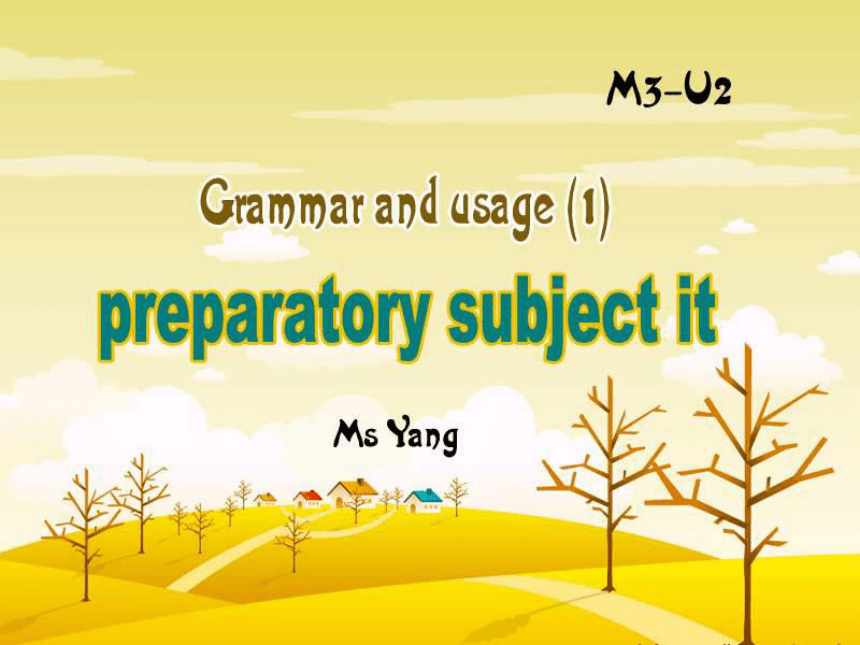
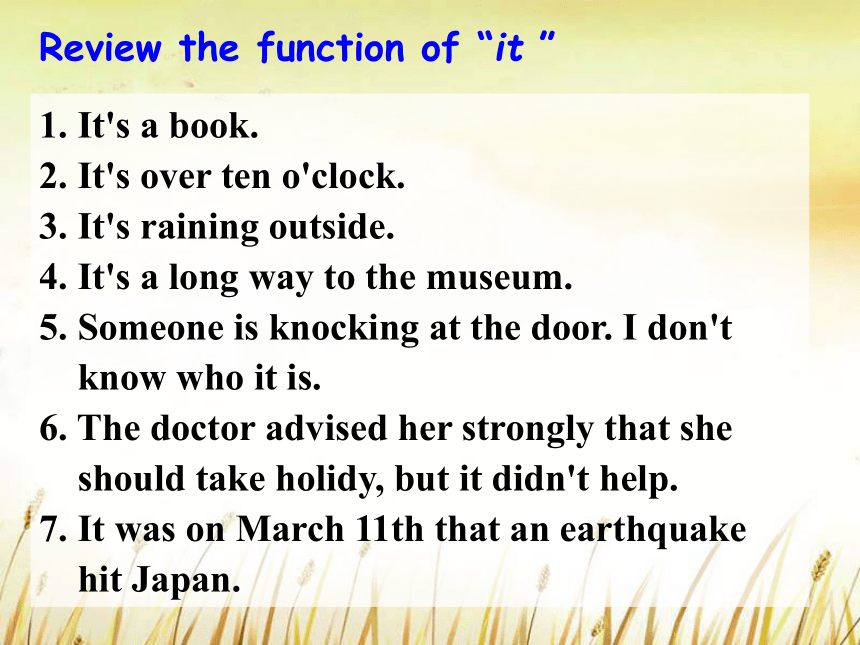
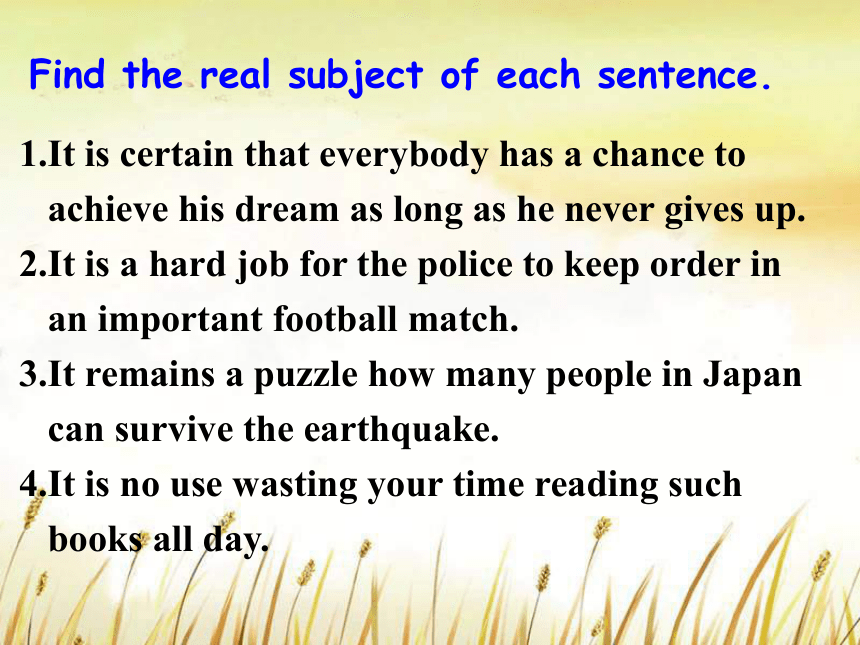

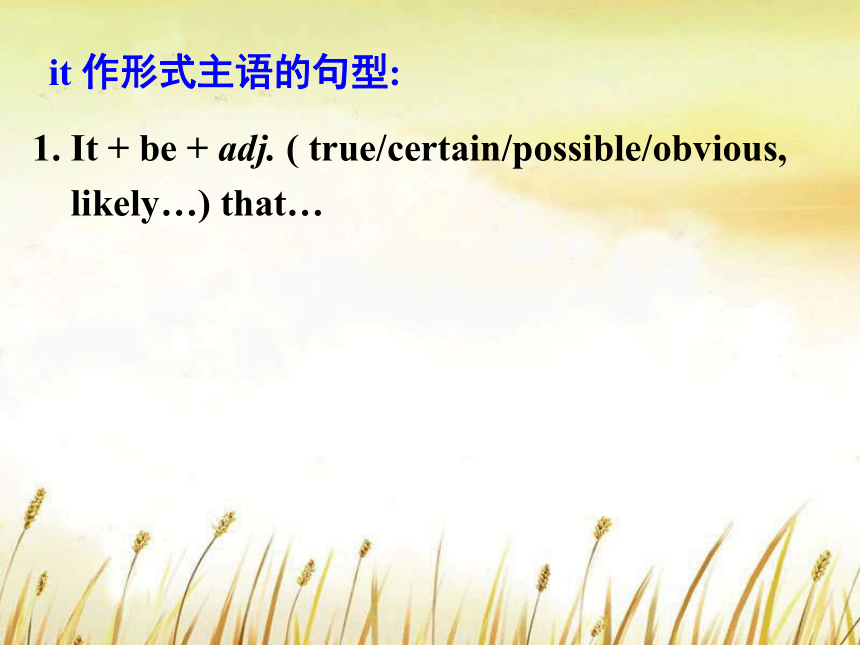
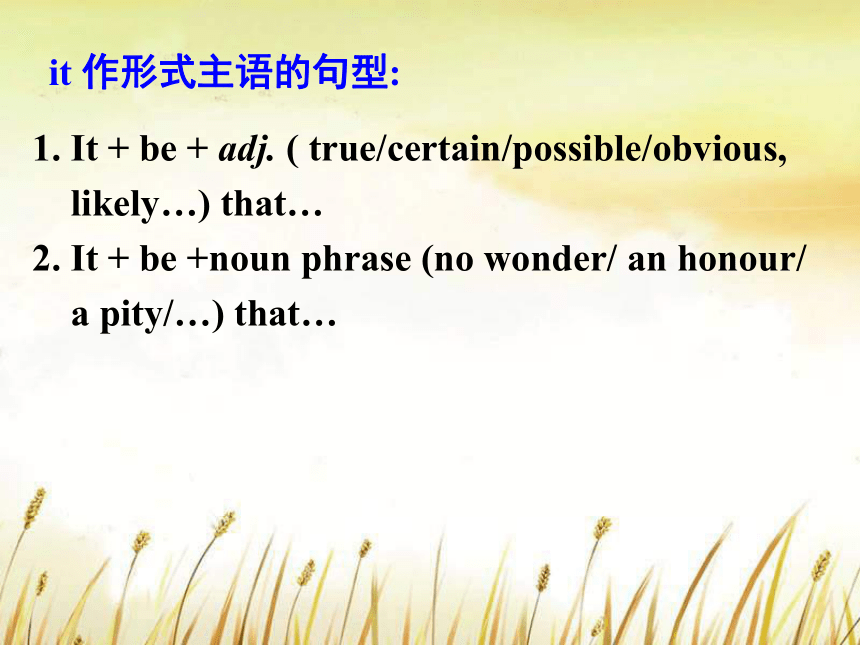
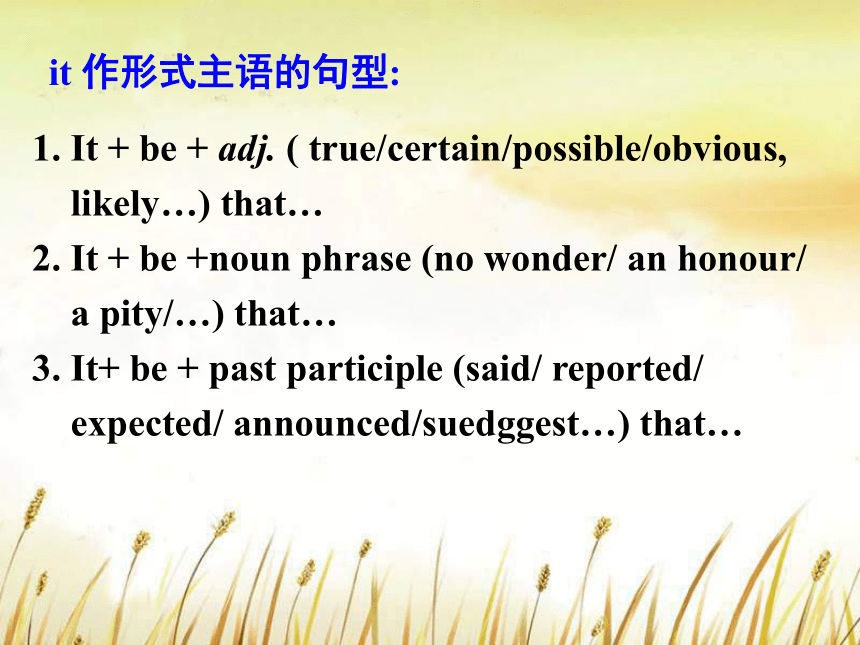
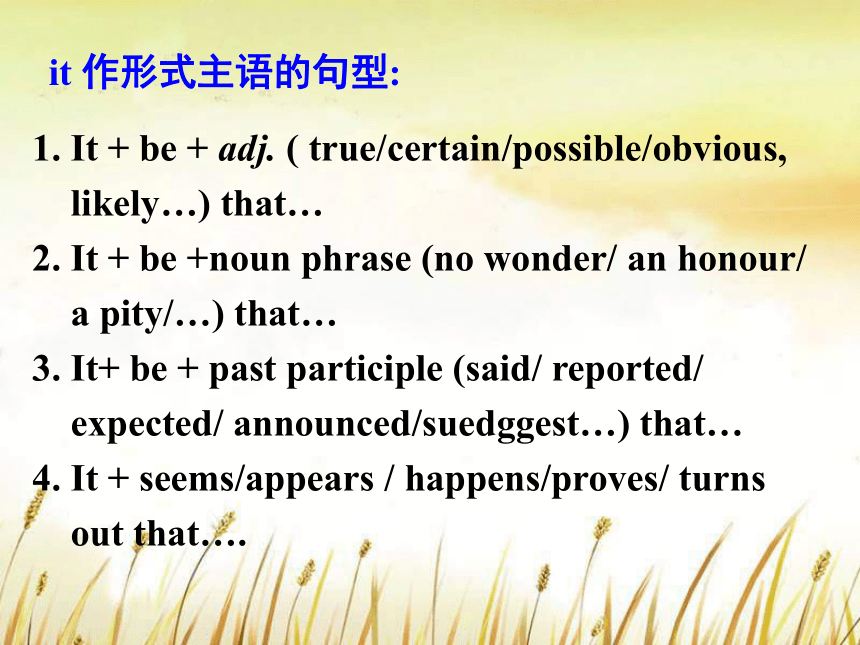
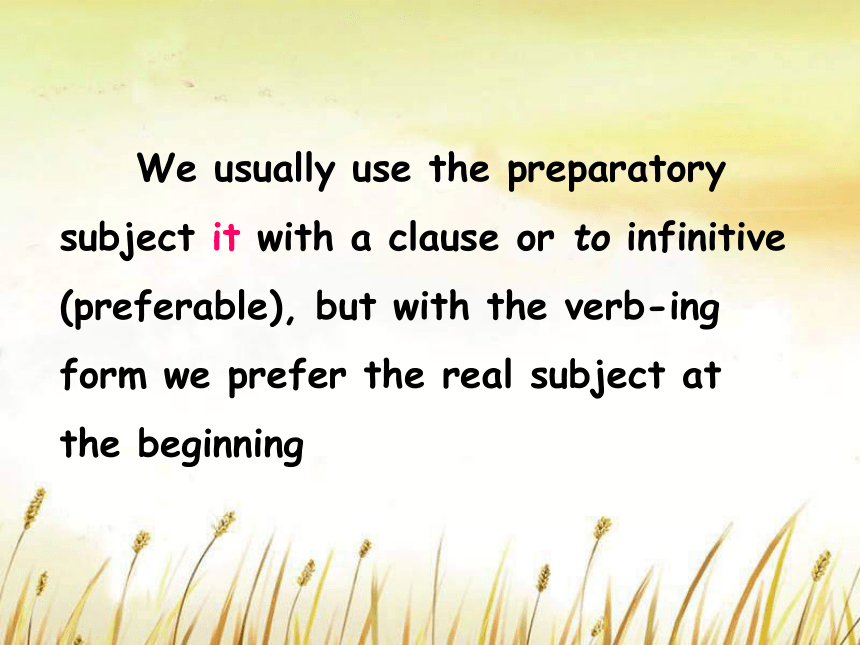


文档简介
课件69张PPT。Review the fun_ction of “it ”1. It's a book.
2. It's over ten o'clock.
3. It's raining outside.
4. It's a long way to the museum.
5. Someone is knocking at the door. I don't know who it is.
6. The doctor advised her strongly that she should take holidy, but it didn't help.
7. It was on March 11th that an earthquake hit Japan.1.It is certain that everybody has a chance to achieve his dream as long as he never gives up.
2.It is a hard job for the police to keep order in an important football match.
3.It remains a puzzle how many people in Japan can survive the earthquake.
4.It is no use wasting your time reading such books all day.Find the real subject of each sentence. it 作形式主语的句型:1. It + be + adj. ( true/certain/possible/obvious, likely…) that… it 作形式主语的句型:1. It + be + adj. ( true/certain/possible/obvious, likely…) that…
2. It + be +noun phrase (no wonder/ an honour/ a pity/…) that… it 作形式主语的句型:1. It + be + adj. ( true/certain/possible/obvious, likely…) that…
2. It + be +noun phrase (no wonder/ an honour/ a pity/…) that…
3. It+ be + past participle (said/ reported/ expected/ announced/suedggest…) that… it 作形式主语的句型:1. It + be + adj. ( true/certain/possible/obvious, likely…) that…
2. It + be +noun phrase (no wonder/ an honour/ a pity/…) that…
3. It+ be + past participle (said/ reported/ expected/ announced/suedggest…) that…
4. It + seems/appears / happens/proves/ turns out that…. it 作形式主语的句型: We usually use the preparatory subject it with a clause or to infinitive (preferable), but with the verb-ing form we prefer the real subject at the beginningTravelling to Beijing takes up a lot of my time. It takes up a lot of my time travelling to Beijing .( preferable)Travelling to Beijing takes up a lot of my time. It takes up a lot of my time travelling to Beijing .( preferable)(correct)Travelling to Beijing takes up a lot of my time. It takes up a lot of my time travelling to Beijing .It takes sb some time to do sth( preferable)(correct)Travelling to Beijing takes up a lot of my time. It takes up a lot of my time travelling to Beijing . Read the letter on page 31 and
Rewrite the underlined sentences using the preparatory subject it.
2. _________________________________
_________________________________. Read the letter on page 31 and
Rewrite the underlined sentences using the preparatory subject it.Answers:
2. _________________________________
_________________________________. Read the letter on page 31 and
Rewrite the underlined sentences using the preparatory subject it.Answers: It happens that several racial groups live in Singapore.3. ________________________________
________________________________
________________________________. It is fun to hear different people speaking different languages all at the same time4. ________________________________.3. ________________________________
________________________________
________________________________.It is certain that I’ll see you next week It is fun to hear different people speaking different languages all at the same timeUnit 2 Word power There are over 190 countries which are members of the United Nations.Pairwork What do you think the official language of the United Nations are? There are over 190 countries which are members of the United Nations.Pairwork What do you think the official language of the United Nations are? English, Chinese, French, Russian, Spanish, Arabic. About 6,000 languages are spoken in the world today. The 10 most widely spoken languages are Chinese, Spanish, English, Hindi, Arabic, Bengali, Portuguese, Russian, Japanese and German. Look at the following pictures, tell us which country it is and what its official language is.the United Kingdom
Englishthe United States
EnglishFrance
FrenchAustralia
EnglishGermany
GermanItaly
Italian Canada
English, FrenchRussia
RussianMexico
Spanish Formal and informal English□--- Hi, Bob. Fancy meeting you here.
□--- Good morning, Mr. Mosley.
How are you? 1. (To a professor you first meet )□--- Hi, Bob. Fancy meeting you here.
□--- Good morning, Mr. Mosley.
How are you? 1. (To a professor you first meet )□ --- Mr. Wells, would you be kind enough to pass me the salt?
□ --- Could you possibly pass me the salt?
□ --- Pass me the salt, Jack.2. (To a close friend )□ --- Mr. Wells, would you be kind enough to pass me the salt?
□ --- Could you possibly pass me the salt?
□ --- Pass me the salt, Jack.2. (To a close friend )notices,
business letterdaily lifewritingspeakinglook upa lot ofa large amount/ number ofFormal and informal Englishlook upa lot ofa large amount/ number ofFormal and informal EnglishadmireI’m sorry to say…stopI’m sorry to say…stopI regret to inform you…I’m sorry to say…stoppreventI regret to inform you…speak to you aboutI'd like you to dowait forthink about…draw your attention tospeak to you aboutI'd like you to dowait forthink about…draw your attention toI'd appreciate it if you...speak to you aboutI'd like you to dowait forthink about…draw your attention toI'd appreciate it if you...look forward tospeak to you aboutI'd like you to dowait forthink about…draw your attention toI'd appreciate it if you...look forward totake … into considerationspeak to you aboutwait forthink about…I'd like you to doPractiseRead the following letter. Rewrite it in formal English
using the words or phrases we learnt.
2. It's over ten o'clock.
3. It's raining outside.
4. It's a long way to the museum.
5. Someone is knocking at the door. I don't know who it is.
6. The doctor advised her strongly that she should take holidy, but it didn't help.
7. It was on March 11th that an earthquake hit Japan.1.It is certain that everybody has a chance to achieve his dream as long as he never gives up.
2.It is a hard job for the police to keep order in an important football match.
3.It remains a puzzle how many people in Japan can survive the earthquake.
4.It is no use wasting your time reading such books all day.Find the real subject of each sentence. it 作形式主语的句型:1. It + be + adj. ( true/certain/possible/obvious, likely…) that… it 作形式主语的句型:1. It + be + adj. ( true/certain/possible/obvious, likely…) that…
2. It + be +noun phrase (no wonder/ an honour/ a pity/…) that… it 作形式主语的句型:1. It + be + adj. ( true/certain/possible/obvious, likely…) that…
2. It + be +noun phrase (no wonder/ an honour/ a pity/…) that…
3. It+ be + past participle (said/ reported/ expected/ announced/suedggest…) that… it 作形式主语的句型:1. It + be + adj. ( true/certain/possible/obvious, likely…) that…
2. It + be +noun phrase (no wonder/ an honour/ a pity/…) that…
3. It+ be + past participle (said/ reported/ expected/ announced/suedggest…) that…
4. It + seems/appears / happens/proves/ turns out that…. it 作形式主语的句型: We usually use the preparatory subject it with a clause or to infinitive (preferable), but with the verb-ing form we prefer the real subject at the beginningTravelling to Beijing takes up a lot of my time. It takes up a lot of my time travelling to Beijing .( preferable)Travelling to Beijing takes up a lot of my time. It takes up a lot of my time travelling to Beijing .( preferable)(correct)Travelling to Beijing takes up a lot of my time. It takes up a lot of my time travelling to Beijing .It takes sb some time to do sth( preferable)(correct)Travelling to Beijing takes up a lot of my time. It takes up a lot of my time travelling to Beijing . Read the letter on page 31 and
Rewrite the underlined sentences using the preparatory subject it.
2. _________________________________
_________________________________. Read the letter on page 31 and
Rewrite the underlined sentences using the preparatory subject it.Answers:
2. _________________________________
_________________________________. Read the letter on page 31 and
Rewrite the underlined sentences using the preparatory subject it.Answers: It happens that several racial groups live in Singapore.3. ________________________________
________________________________
________________________________. It is fun to hear different people speaking different languages all at the same time4. ________________________________.3. ________________________________
________________________________
________________________________.It is certain that I’ll see you next week It is fun to hear different people speaking different languages all at the same timeUnit 2 Word power There are over 190 countries which are members of the United Nations.Pairwork What do you think the official language of the United Nations are? There are over 190 countries which are members of the United Nations.Pairwork What do you think the official language of the United Nations are? English, Chinese, French, Russian, Spanish, Arabic. About 6,000 languages are spoken in the world today. The 10 most widely spoken languages are Chinese, Spanish, English, Hindi, Arabic, Bengali, Portuguese, Russian, Japanese and German. Look at the following pictures, tell us which country it is and what its official language is.the United Kingdom
Englishthe United States
EnglishFrance
FrenchAustralia
EnglishGermany
GermanItaly
Italian Canada
English, FrenchRussia
RussianMexico
Spanish Formal and informal English□--- Hi, Bob. Fancy meeting you here.
□--- Good morning, Mr. Mosley.
How are you? 1. (To a professor you first meet )□--- Hi, Bob. Fancy meeting you here.
□--- Good morning, Mr. Mosley.
How are you? 1. (To a professor you first meet )□ --- Mr. Wells, would you be kind enough to pass me the salt?
□ --- Could you possibly pass me the salt?
□ --- Pass me the salt, Jack.2. (To a close friend )□ --- Mr. Wells, would you be kind enough to pass me the salt?
□ --- Could you possibly pass me the salt?
□ --- Pass me the salt, Jack.2. (To a close friend )notices,
business letterdaily lifewritingspeakinglook upa lot ofa large amount/ number ofFormal and informal Englishlook upa lot ofa large amount/ number ofFormal and informal EnglishadmireI’m sorry to say…stopI’m sorry to say…stopI regret to inform you…I’m sorry to say…stoppreventI regret to inform you…speak to you aboutI'd like you to dowait forthink about…draw your attention tospeak to you aboutI'd like you to dowait forthink about…draw your attention toI'd appreciate it if you...speak to you aboutI'd like you to dowait forthink about…draw your attention toI'd appreciate it if you...look forward tospeak to you aboutI'd like you to dowait forthink about…draw your attention toI'd appreciate it if you...look forward totake … into considerationspeak to you aboutwait forthink about…I'd like you to doPractiseRead the following letter. Rewrite it in formal English
using the words or phrases we learnt.
